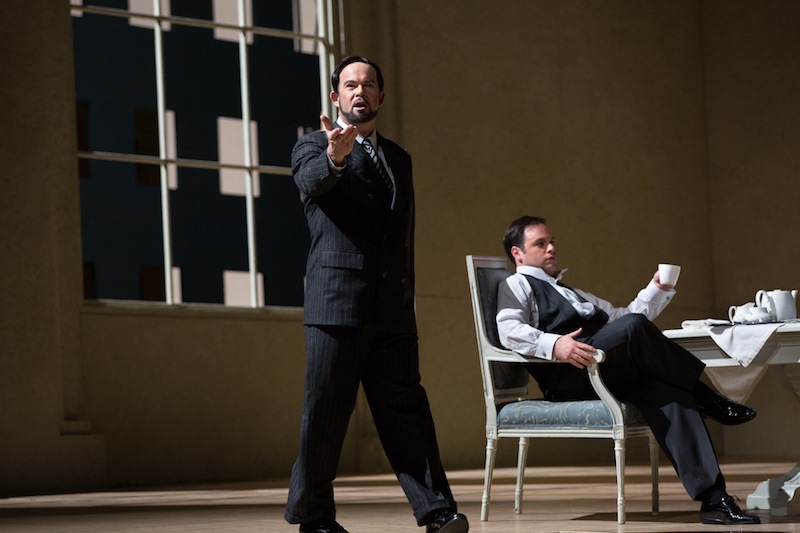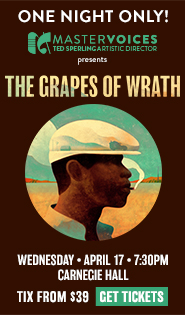Met’s superb “Rake’s Progress” touches the mind and heart

Gerald Finley and Paul Appleby in Stravinsky’s “The Rake’s Progress” at the Metropolitan Opera. Photo: Marty Sohl
It would be hard to believe if it weren’t printed there in the program: Friday night’s opening of the Metropolitan Opera’s revival of The Rake’s Progress was only the twenty-fourth performance of the work in the company’s history. A brilliant opera from Igor Stravinsky, with a libretto by W. H. Auden and Chester Kallman, a work that has had more than sixty years to grow familiar to audiences and administrators, has now been presented just two dozen times at one of the world’s leading opera houses.
Jonathan Miller’s production, which debuted in 1997, is absolutely terrific. Beyond the score—which is punchy, funny, lyrical, and moving, with a dazzling historical and intellectual self-awareness—the cast is ideal, the staging is visually and theatrically involving, and the music making from the orchestra and conductor James Levine was at the highest level.
Miller’s set is an excellent companion to the artifice of the music. The various scenes are enclosed in sets that synthesize the visual arts from the 1920s and ’30s—tableau that allude to paintings by DeChirico, Ben Shahn, Hopper, Toulouse-Lautrec, Damien Hirst—and stimulates memories of things seen, making everything interesting and involving while never distracting from the staging. The chorus was fine vocally, and clearly enjoyed being on display in Judy Levin’s costumes. Levine’s way with the score was more on the legato side than one commonly hears, but was completely successful.
Tenor Paul Appleby and bass-baritone Gerald Finley shared the stage as the antagonists Tom Rakewell and Nick Shadow, respectively, and what a pair they were. Stravinsky was one of the greatest dramatists in music, defining characters through notes with sharp authority, but there can be a price, which is that the writing at times sits in difficult registers for the singers. Appleby not only handled the immediate, low register challenges of “The woods are green”, but sang with mesmerizing tonal clarity and melodic elegance in the tremendous, brief aria “Love, too frequently betrayed.”
Appleby was excellent in Tom’s vocal transformations from naïve to worldly, desperate, and, finally, tragic. He was also easy and light on his feet, moving with a young man’s air—a natural in the role. Finley, with his hair slicked down and a thin, sinister beard, was dynamic, changing moods vocally from obsequious to insinuating to malevolent. His “Fa la la” pantomime was marvelous, as he spun on his heels and flicked his finger like a switchblade, commanding the audience’s attention.
Finley ratcheted up the intensity of the scene in front of Tom’s prospective grave into an engrossing and nerve-wracking moment. That entire scene felt like the high point of the evening but then was topped by a wrenching final scene, with Tom confined to Bedlam, imagining himself Adonis.
Tom’s fiancée Anne Trulove—soprano Layla Claire—visits, forgives, and comforts him. Claire started the opera a little slowly, her voice sounded fine but her dramatic projection was subdued. But her performance grew with each measure, opening up with “No word from Tom,” and she was powerfully moving as she sang “Gently, little boat” to Tom in the asylum.
The supporting roles were excellently taken. As Baba the Turk, the bearded lady, Stephanie Blythe exploded with charisma, her vast mezzo at times drowning out the entire orchestra. Bass Brindley Sherratt made his Met Opera debut as Anne’s father, and sounded great with an easy charm. The auctioneer, Selem, has one scene, and tenor Tony Stevenson was superb with fine singing and his acting.
Stravinsky cultivated the impression that he built amazing musical architecture in which expression was inconsequential. But with a magician such as him, that turns out to be misdirection. Auden’s great libretto initially presents the characters as archetypes, then gradually builds them into fully dimensional humans. The composer follows along, entertaining us through short, scattered fragments of action, eliding exposition by showing the characters transformed from one scene to the next.
For most of the opera Stravinsky creates a fascinating objective feeling by writing vocal music that is full of intervals more often heard via instruments. Then in the final scene, the music is gliding, lyrical, and the lines are long, measured, sad, real, with an abrading ache that one actually feels, rather than merely observes.
But the opera is alway conscious of its own artifice. The characters deliberately express themselves with the knowledge that they are in front of an audience. The magic is that, just as the effect of the work lands on an emotionally crushing point, with the chorus of madmen calling on us to weep for Adonis/Tom, the opera turns on a dime. The main characters ask “Good people, just a moment,” and sing to us the lessons of the allegory with music that returns to a brilliant sheen.
The house was full, the audience responded with great enthusiasm and this excellent production is clearly a real draw. Bizarrely, there are only two more performances. Don’t miss one of them.
The Rake’s Progress will be repeated May 4 and May 9. metopera.org



Posted May 03, 2015 at 2:50 am by me!
Absolutely wonderful – couldn’t agree more!
Posted May 05, 2015 at 9:44 pm by CastaDiva
Yes, bizarre, indeed, that there should be just three performances of this wonderful opera. I was at the Mon. night performance and loved it. All the singers were in fine form, the Met orchestra and chorus performed as splendidly as they always do, and the sets were pleasing. The Met appears to misjudge its audience, giving us plenty of the usual fare each season, but being parsimonious with modern gems such as this. It couldn’t be more wrong, as the Rake was clearly a winner with last night’s audience.
Posted May 10, 2015 at 2:58 pm by Pasticcio
I walked out at the intermission of the Monday night performance. Why? Was it the excruciatingly precious, dramaturgically inert libretto which had about as much relationship to the substance of Hogarth’s paintings as a lace doily? Was it the bloodless, wallpaperishly noncommittal music by Stravinsky whose theatrical sensibilities seem to desert him here? Was it the annoyingly generic, nonspecifically modern, gratuitously Edward Hopper-ish set design of Peter J. Davison? I love Auden’s poetry and essays and revere Stravinsky. But even the best have bad outings. If Rake’s Progress had been written by non-name brand artists, it would have sunk without a trace years ago. This opera is the Apotheosis of Put-on. It evidently continues to enjoy a rich, steady traffic of smarmy snob appeal enthusiasts. I’m proud not to be one of them.